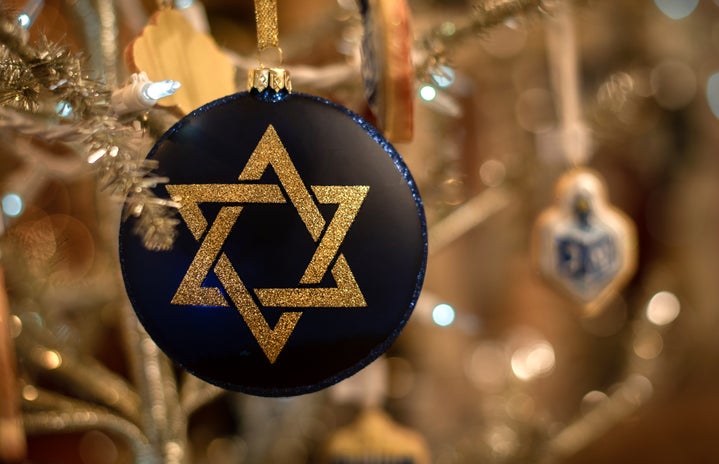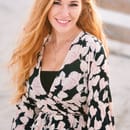The smell of potato latkes filled the air, tempting the Goldfarb family’s appetite as they waited to dig into the Hanukkah treat. A spread of applesauce, sour cream and jams decorated the table.
Macie Goldfarb and her brother watched with eager eyes as their mother passed them colorfully wrapped gifts, their fingers tingling to tear through the smooth paper.
The University of Florida journalism sophomore said her family has always had to adjust their Hanukkah schedule around school and work. But this year, her head will be spinning with stress from her University of Florida finals while her family spins the dreidel at home in Melbourne, Florida.
UF’s 2020 finals week spans from Dec. 12 to Dec. 18, and Hanukkah lasts Dec. 10 to Dec. 18 — making some Jewish students feel the need to stay in Gainesville and away from their families for finals. While Hanukkah is not the most important holiday in the Jewish faith, students like Goldfarb say UF’s finals scheduling plays into a larger trend of institutions prioritizing Christian religions over those of minorities.
Bailee Rousso, a 21-year-old UF family, youth and community sciences junior, has been involved in UF Hillel for nearly two years, she said. Through her time as a Jewish college student, celebrating holidays has become an obstacle to her classes.
Her sophomore year, she said she asked a professor to take an exam that fell on the second day of Yom Kippur early and was met with a curious response. Instead of fulfilling her request, she was told she needed to wait for confirmation that the holiday was real.
“If you’re going to know about any Jewish holiday, that’s the one you should know about,” she said. “It was kind of an unknown to me when I came to college because I had always gone to Jewish-based schools, and we always had off for holidays, so it was upsetting for me when professors didn’t even know the holidays that were happening.”
Traditionally, Rousso spends Hanukkah with her parents and grandparents, and her favorite memories were spent making latkes with her grandmother. This year, she plans to spend Thanksgiving with her family but will go back to Gainesville after filling up on turkey and potatoes.
Then, her finals will keep her at UF until Dec. 17 — the day before the last night of Hanukkah. While all exams will be online, both Goldfarb and Rousso said the family festivities will be too distracting to excel on their finals.
“It’s upsetting for me,” she said. “There have been years in the past where I’ve missed part of Hanukkah because I’ve had to be on campus for exams, but never entirely.”
The 19-year-old Goldfarb said she will stay in Gainesville for her finals, and her family will Facetime her on each night of Hanukkah she misses.
She said conflicts with Hanukkah are bound to arise with the holiday’s dates varying every year. Throughout her education, she has struggled to balance her faith and her classes.
While classes are suspended for Christian holidays, such as Good Friday and Christmas, Goldfarb has to request time off — and sometimes has still had work due — on her faith’s highest holy days, including Yom Kippur and Rosh Hashanah.
After years of being disappointed, Goldfarb said she and her family have given up on their hopes for a more progressive society. With only 1.8% of the American population identifying as Jewish, she feels that her holidays will never be treated with the regard Christian holidays receive.
Hanukkah is not the most important holiday in the Jewish faith, she said. However, Goldfarb said she believes the commercialization of Christmas has also seeped into her religion, making Hanukkah more well-known to the secular world.
“You pay more attention to the things you’re associated with, and a lot of people aren’t Jewish,” she said. “It goes to show with Hanukkah too. While it is a less important holiday, us as Jews are aware that it’s the holiday that other people know most about, but even though other people know about it, it’s going ignored in terms of exams.”
While Jewish students are still a minority at UF, the university is number one on Hillel International’s College Guide of the top 60 public universities based on the Jewish population. Of UF’s 35,405 undergraduate students, 6,500, or 18%, are Jewish.
Despite UF’s comparably large Jewish representation, Goldfarb believes there are still discrepancies in how the university treats students of different religions.
“Especially somewhere like UF, I would think they would at least take it to take it upon themselves to reevaluate,” she said. “But at the same time, it is hard to expect it because it never has been a priority for them, so it’s the difference between how you think people should act toward the situation and how they actually do.”
Associate Provost for Undergraduate Affairs Angela Lindner wrote in an email to Her Campus UFL that religious holidays are never considered when planning UF’s academic calendars, but students can make arrangements with their professors through the university’s Religious Holidays policy.
She added that academic calendars are planned five years in advance, and finals fall at approximately the same time each year.
“At the University of Florida, students and faculty work together to allow students the opportunity to observe the holy days of their faith,” she said.
Goldfarb said that although the inequities are seen on UF’s campus, the staff and student body is not to blame. The United States’ focus on majority groups, ethnicities and religions in society has created a foundation of inequality.
“I’m not accusing everyone else of not being respectful, because I don’t think that’s true at all, but it’s just like a lack of empathy and understanding for other people in minorities in America,” she said. “Because Jews are an ethnic group and therefore a minority in America, I think that it, bigger picture, shows how a lot of different cultures go unappreciated and unrecognized here.”


